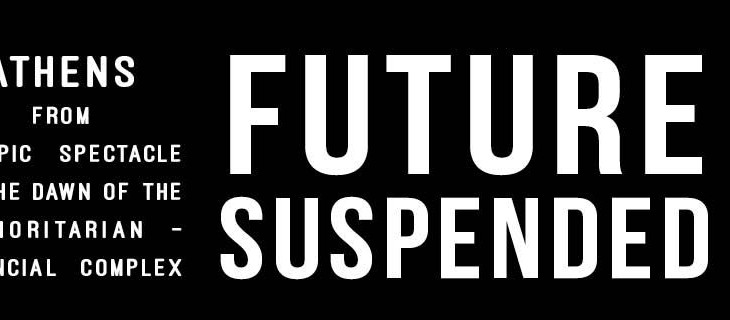From Olympic spectacle to social crisis: review of Future Suspended

[responsivevoice_button]
Review: Crisis-Scape’s new film invites us in to the shadows of Athens, a city tenuously held together by state imposed order, privatisation, anxiety and violence.
New documentary by the Crisis-Scape collective, Future Suspended focuses on the hues of the Greek crisis usually absent from media headlines that hover between flaming streets and indecisive boardrooms. Both elegant yet unflinching, the film draws upon voices from everyday life tracing the trajectory of Greece’s recent history: ‘from Olympic spectacle’ to what the film names, ‘the dawn of the authoritarian – financial complex’.
Using the glossy metro as a metaphor, the film transports us through the mega infrastructure which fuelled Greece’s decade of rapid growth (the pinnacle of which was the 2004 Olympic Games, a testament Greece had ‘made it’), infrastructure which now seem absurd monuments. After three years of fiscal adjustment – as the authorities like to call the on-going social catastrophe – Greece today is encapsulated by three themes which the documentary explores: privatised, devalued and militarised.
Privatised: land, Olympics and the neoliberal city.
One of the conditions of economic bail-out was that the government take on one of the largest disinvestment programmes in the world. And all state owned enterprises and other public assets continue to be put up for sale with one single stated aim: any money raised will be used solely to repay Greece’s creditors. Debt repayments are currently made towards European governments, the European bailout fund and the IMF who currently hold three quarters of Greece’s debt, one quarter is in the form of bonds – which from the millions made on it, we know is partly in the hands of various hedge funds. The film details the role of the Greek TAIPED fund responsible for the transfer of all water, rail and electricity companies, airports, ports and roads, real estate properties, mines and licensing to private investors. TAIPED is not only composed of ex-employees from many of the soon-to-be privatised companies, but thus far there has been no public access to information about decision making withing TAIPED, decisions which have an immense public impact.
And yet, much of the dystopian tone of the film comes from images of those public assets unsold and lying dormant. Just like Spain, where the landscape is dotted with white elephant projects like airports with no planes, Future Suspended takes us to the desolation of the abandoned Elliniko airport, which the state had hoped to sell to foreign developers eager to develop luxurious real-estate. The reality is far from the government’s hopes: the old airport has been left to dilapidate, with no investment forthcoming the airport has been transformed into a community garden by a local community resisting the sell-off.
Devalued: everyday racism, the depreciation of labour and of human life
Many who watch the film may be well aware of the explosion of racist and xenophobic crimes, linked by most to Golden Dawn’s growing popularity. Future Suspended looks at the rising phenomenon of race crimes through the prism of the urban landscape, crimes which according to the filmmakers, are primarily spearheaded, not by the Golden Dawn, but by a more pervasive mainstream state apparatus. Using narratives of everyday racism the film demonstrates the extent to which state propelled racism is just as formidable and culpable as thug violence. Through various interview, eye-witnesses give account to the manner in which scapegoating migrants has had increased purchase since the crisis began. The dangers and myths are powerfully extolled in a scene with members of the United African Women’s Organisation in Athens, who describe how migrants are being targeted by the government to divert people’s attention from the real problem, government imposed impoverishment.
Militarised: state of emergency and the ill city
Future Suspended’s final theme, focuses on militarisation. Despite maintaining a semblance of democracy, the film details the manner in which, under crisis the state apparatus has become radically authoritarian. The film walks us through the at-times heavily militarised neighbourhoods of Athens, such as Exarcheia, wherein the state of emergency is used by the police to purge resistance to the crisis. It often comes as a surprise to hear that Greece has one of the largest military expenditures as a proportion of GDP in the EU. However, with corruption scandals unfolding over the past month regarding foreign companies bribing officials to win contracts, and the willing determination of politicians to push through austerity, the issues raised by Future Suspended are perhaps less surprising.
In order to deal with a society that is crumbling and the corollary widespread disobedience towards the state’s agenda, the state has needed to reinvent its repressive rhetoric and technologies. This is not done only through the use of force, but also through increased use of legislative acts used to bulldoze through unpopular changes, without Parliamentary approval. Combined, Future Suspended invites us to the shadow of a city, kept together by state imposed order, violence, anxiety and poverty.
Originally published: http://www.opendemocracy.net/opensecurity/christina-laskaridis/from-olympic-spectacle-to-social-crisis-review-of-future-suspended
